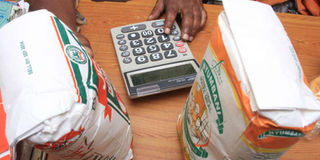Importation of maize is insufficient to address shortage - Cofek

A shopkeeper bills a customer who bought two packets of maize flour at a shop in Nyeri on May 21, 2014. The government says another shipment from Mexico is expected in Mombasa within two weeks. PHOTO | JOSEPH KANYI | NATION MEDIA GROUP
What you need to know:
- Kenyans consume a total of three million bags monthly and the latest consignment can hardly last a week.
- Large scale millers exhausted their allocation of 450,000 bags and they have currently been buying at market rates.
- Cofek has asked the National Assembly to come up with a more sustainable Bill that will fully solve high food prices.
Millers have warned that the 335,000 bags of Mexican maize that were expected at the port of Mombasa yesterday were unlikely to bring down flour prices, terming them inadequate.
The government is banking on maize imports to bring down the cost of flour, currently costing an average of Sh150 for a two-kilogramme packet.
Millers say the price of the commodity will remain high in the next two months, but they expect the cost to come down when the full consignment of imports from Mexico arrives.
MAIZE CONSUMPTION
The government says another shipment from Mexico is expected in Mombasa within two weeks.
Millers are purchasing the Mexican maize at between Sh3,500 and Sh5,000, which is cheaper when compared with the Sh4,750 in the local market.
“The maize imports are intended to increase the maize stocks in the country and subsequently lower the price of unga,” government spokesman Eric Kiraithe said during a news conference yesterday.
Kenyans consume a total of three million bags monthly and the latest consignment can hardly last a week.
SUPPLEMENTARY BUDGET
Mr Kiraithe said a high-level multi-agency team is in the final stages of preparing a supplementary budget to address the high cost of basic commodities.
The budget will be presented to Parliament in the course of next week.
“The supplementary budget will be seeking Parliament’s approval for measures to make maize flour affordable for the majority of Kenyans,” he said.
Last week, President Kenyatta said that Parliament, which resumed sittings on Tuesday, will come up with measures to curb the rising cost of basic commodities.
Analysts argue that Treasury can come up with a proposal to introduce subsidies on basic commodities, which has to be endorsed by Parliament before coming into effect.
IMPROVE AGRICULTURE
Economist Anzetse Were says subsidy is a short-term measure and that a long-term solution for the high cost of food is required.
“Subsidy is a quick measure to curb the immediate cost, however, a long-term solution such as improving our agriculture efficiencies and production is required to permanently address the problem,” he said.
According to Mr Kiraite, the ship carrying the Mexican maize was expected to dock yesterday.
The vessel, MV IVS Pinehurst, is carrying 29,900 tonnes of bulk maize.
According to Kenya Ports Authority (KPA) senior communications officer Silvan Mghanga, the vessel had been scheduled to berth any time last evening.
“A ship that has been offloading at the Grain Bulk Handlers has completed the process and IVS Pinehurst will be given priority to berth. We expect it to dock after the other one leaves,” he said.
DROUGHT
It was not immediately possible to establish who the importers are, since the agents could not be reached on phone.
Last month the government released 750,000 bags from the Strategic Grain Reserve to address the runaway price of the staple.
However, some of the maize was found to be unfit for human consumption.
Large scale millers exhausted their allocation of 450,000 bags and they have currently been buying at market rates.
A severe drought that has swept across eastern and southern Africa since late last year has caused a huge hunger crisis in the region.
Over 20 million lives are at stake; in Kenya four million people, including 1.2 million children, are facing starvation, according to estimates from the United Nations (UN) offices in Nairobi.
HOARDING FOOD
Already, hundreds of livestock have died, crops have wilted, and food stores run out, sending the price of staple foods such as maize, sugar and milk to record highs due to the huge demand.
Yesterday, Mr Kiraithe warned manufactures and businessmen against taking advantage of the food shortages to engage in the unscrupulous behaviour of hoarding food.
“We appeal to farmers, manufacturers and suppliers in the food chain to desist from hoarding any commodity. That is illegal and amounts to sabotage of the economy.”
Meanwhile, the Consumer Federation of Kenya (Cofek) has asked the National Assembly to come up with a more sustainable Bill that will fully solve high food prices.
SUSTAINABLE REMEDY
Cofek secretary-general Stephen Mutoro in a press statement yesterday said the plan by MPs to review the Finance Bill to reduce current high food prices is barely sufficient as it is only short-term and unsustainable.
“The move by the National Assembly is a knee-jerk political reaction meant to address symptoms rather than the root cause of the problem.
"Amendments to the Finance Bill, a key legislation that spells out revenue generation measures, will mean a delicate balancing act between further taxation on other sectors and relief on food sector. It’s a case of digging three holes to fill one,” Mr Mutoro said.
He poked holes on the expected supplementary budget to reallocate funds to sectors contributing to high food prices, saying the move exposed the government’s poor planning.
Reports by Gerald Andae, Carolyne Agosa, Gitonga Marete and Faith Nyamai




